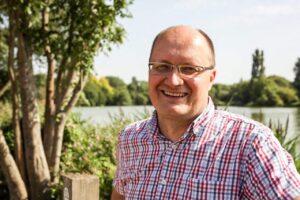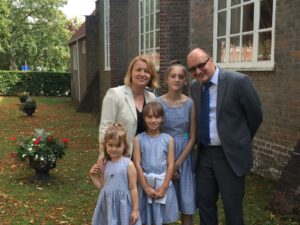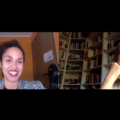
Watch
Michal & democracy

Today, September 15, is International Democracy Day. In his message, Guterres, United Nations General Secretary, proposes to seize this crucial moment when humanity faces the pandemic “to build a fairer, more inclusive and sustainable world with full respect for human rights”. So, we asked Michal Siewniack, Community Development Manager of some development projects for disadvantaged communities in the UK, to tell us about his experience and his point of view.
Michal Siewniak is Polish and has lived in England for about fifteen years (happily, he says). His wife is Croatian and their three daughters, of fourteen, eleven and five years old, were all born on British territory. They live about thirty kilometres from London, in the county of Hertfordshire, in Welwyn Garden City.

We talk to each other through a video call. The excuse is the theme of the International Day of Democracy, in 2020. But I am also curious to know more about his political, civil and social commitment, after reading this article he wrote for the Political Movement for Unity website.
Michal has a smiley, broad, round face that sort of shows his origins. He is also very talkative. So, in a few minutes, I discover that, before moving to England, he also lived in Poland, Croatia and Italy. That is why he is fluent in four European languages: Polish, of course, and then Croatian, Italian and English.
«We have a very open heart – Michal says about his family – We were happy in Italy; we were happy in Croatia. Now, we are very happy in England. We are truly Europeans, and in a way… “globalists”, as well. We really feel everywhere at home!».

Michal had an opportunity to serve as a Councillor in Welwyn Hatfield and has worked with several non-governmental organizations as a Community Development Manager for the past eleven years. He loves his work and is passionate about it. Today, he is working in Hertfordshire, in the communities of Wormley and Turnford, on a project that aims to improve living conditions in the most disadvantaged areas of England. It is called “Big Local” and is funded by the “Big Lottery Fund”: «I’ve been managing this project on behalf of residents people who live in that area, 12.000 people, for the last two years. This area, because of issues and challenges, has received one million pounds, and people who live in that area have to decide how to spend that money».
Not only that: according to the project, it is the community that must find the best way to get involved, to develop a plan that helps to achieve tangible results, that must identify local needs and look for ways to address them; and that, above all, the community must make use of the skills and talents of the local population. In short, a project that speaks of participation, of active citizenship even if… «In that area very few people actually go out to vote. In the 2018 local elections, only 22% of people voted. People are disconnected, disengaged. And that’s why the Big Local is there: to reconnect with community and try to help people understand how they can positively influence change in their local community. So, it is a project which is fantastic, but has a lot of challenges», explains Michal.
Here we go to the theme of this International Day of Democracy… “Guterres, in his speech, invites everyone to seize this crucial moment in which humanity is confronted with the pandemic to ‘build a fairer, more inclusive and sustainable world, with full respect for human rights’… but in your opinion, is this what we are doing? Are we going in this direction?” I ask him.
«It seems to me that the pandemic and various challenges are forcing us to work more productively together. I’m involved in quite a few meetings with different agencies trying to address a local issue. Unemployment is a big one. Mental health is another big one as well. Up skilling and helping people to be trained to do other things, is a big one as well. And so, there are a number of things happening in England and I know that other countries are also doing a lot in this area», Michal replies.
There is an uncertainty that has been tormenting me for some time now, generating doubt and even fear. With the pandemic, our freedoms: to travel, to meet our friends, our family, to experience relations with the community, to participate in a seminar or an event, even to celebrate religious ceremonies, have been limited. Will it not happen that this may favour less democratic governments? Why are we simply getting used to being less free? I share this fear with him. Michal answered me saying: «Very good question. I will response in two parts. First part. Today, I’m flying to Poland in a few hours. I’m going to see my mom and my grandmother. My grandmother is 91 and I’m aware that unfortunately, it is possible that some further restrictions might be imposed on us from October, when we’ll have potentially the second wave of the pandemic. So, I’ll be honest with you, I was thinking about it this week… as an immigrant living in Britain. This is quite difficult for me because I would like to go and see my family more often. At the moment, I feel a little bit like my freedom to travel is limited and that means that I have to find other ways in which I can communicate with my brother and my mom: via zoom, WhatsApp, Facebook or Messenger. And so that’s definitely something which I’ve been reflecting on… on the other hand… Very good question about democracy! And it’s just incredible because in the way I am, as a person, I’m a people’s person. I love being with people. I love hugging people. I love being in a space with other people. So that physical aspect of being in big gatherings is very close to my heart. Today, we are unable to meet in public spaces. You’re not able to go to, for example, big church events and stuff like that. However, I’ve also found, in the last five or six months, that modern technology is still enabling us to really enforce the message around democracy. Because I have the chance to participate in a number of different courses and Zoom meetings, when I was invited to speak about my experience, for example as a Polish national, and someone who was a councillor. I was a councillor locally, regionally so I was a local politician. And I participated in a number of Zoom calls and various webinars on topics such as: civic activism, community activism and political representation of the European nationals in the UK. Otherwise, if It wasn’t for Zoom, that meeting would have being a lot smaller. So, I think definitely our ability maybe to influence change in our communities has also decreased in many ways or is limited. Because we can’t go out, we can’t campaign, we can’t organize demonstrations, maybe because of the social distancing restrictions, but on the other hand, we have other ways and means to really still campaign and spread our message».
Interesting answer, don’t you think? All to be put into practice. Happy International Day of Democracy to all!





